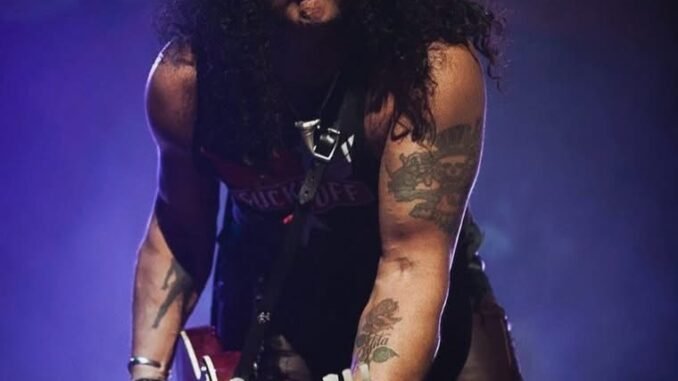
Even Rock Legends Get Banned”: How Slash Was Once Barred from a Guns N’ Roses Show
For a band known as much for its drama as its music, Guns N’ Roses has never shied away from chaos. But few fans know that Slash—arguably the soul of the band’s blistering guitar-driven sound—was once banned from attending one of their own concerts. Not by Axl Rose directly, but by a behind-the-scenes power play so petty and personal that it nearly drove a permanent wedge between the band’s iconic duo.
In a candid interview, Slash revealed a stunning moment in the band’s long and tangled history: “He didn’t know that I was banned from the venue,” he said of Axl, his longtime bandmate and sometimes adversary. The ban wasn’t about drugs, alcohol, or the usual rockstar antics. It was triggered by someone far less known to the public—an old manager, described by Slash as someone he “hated with a passion.”
This wasn’t just a misunderstanding. According to Slash, the manager deliberately blocked his access to the show, fearing that his presence would “trigger” Axl and potentially derail the entire event. The reasoning? Slash and Axl’s history was notoriously fraught with tension, and the manager didn’t want to risk adding fuel to a fire that had smoldered since Slash’s departure from the band in the mid-1990s.
To understand the significance of this moment, you have to go back to the toxic implosion of Guns N’ Roses in the ’90s. By the time Slash quit the band in 1996, communication between him and Axl had all but disintegrated. Creative control had shifted heavily into Axl’s corner, and Slash was frustrated with the band’s direction, particularly with Axl’s increasing reliance on synthesizers and studio experimentation, moving away from their gritty, hard-rock roots.
The split was bitter. For years, the two didn’t speak. Slash referred to Axl in interviews with a mixture of exasperation and sadness, while Axl fired back, calling Slash “a cancer” in one now-infamous quote. The idea of a reunion seemed impossible—until it wasn’t.
Fast forward to the 2010s, and fans were stunned when rumors of reconciliation began circulating. In 2016, Slash and Duff McKagan rejoined Guns N’ Roses for the Not in This Lifetime… Tour, one of the highest-grossing tours of all time. The sight of Slash and Axl sharing a stage again seemed like a miracle.
But even before that olive branch was extended, Slash found himself on the outside looking in—literally. He was denied entry to one of the band’s shows, despite being one of its founding members. “I was just trying to reconnect,” he admitted. “I wasn’t trying to make a scene. I just wanted to see the band.”
The decision to bar him wasn’t just cruel—it was deeply symbolic of the fractures that still existed within the Guns N’ Roses camp. At that time, Axl was still surrounded by a tight circle of managers and advisers who were highly protective of his mental and emotional state. The idea of an unannounced Slash appearance seemed like too big a risk, even if the intentions were innocent.
For Slash, it was a bitter pill to swallow. “It felt like a slap in the face,” he recalled. “Like I didn’t belong anymore in something I helped create.” The incident could have hardened him further. Instead, it deepened his resolve to find a way back—not necessarily into the band, but into peace with his past.
“I knew I had to let go of the anger,” he said. “Axl and I went through a lot, and yeah, we made mistakes. But the music was bigger than either of us.”
Eventually, the two did reconnect, privately at first, away from managers and publicists. What began as a conversation blossomed into rehearsals, and soon enough, the band was on the road again with Slash’s signature top hat and Les Paul back in the spotlight.
Looking back, Slash acknowledges the absurdity of being banned from a show by his own band. “It’s almost funny now,” he said. “But at the time, it was painful. It was a reminder of how bad things had gotten.”
That single moment—being turned away at the gates—captures the larger story of Guns N’ Roses: a band of brilliant, broken people trying to navigate fame, ego, and personal demons. It was never just about the music. It was about survival, redemption, and the long, rocky road back to something resembling friendship.
In the end, Slash’s journey from backstage exile to center stage reunion is a testament to the strange, stubborn magic of rock and roll. Sometimes, the heart and soul of a band can lose each other in the chaos. But if the music’s strong enough—and the wounds eventually heal—they just might find their way back.
Leave a Reply